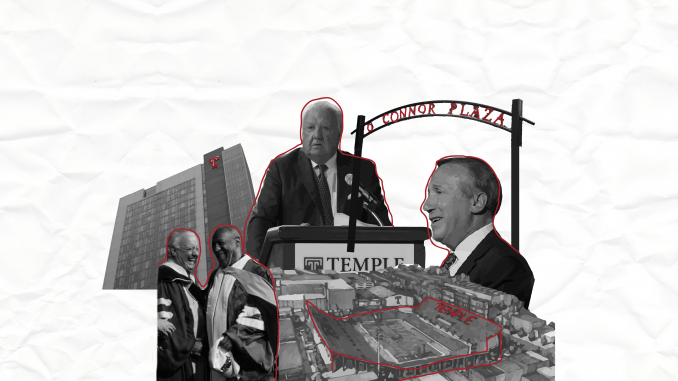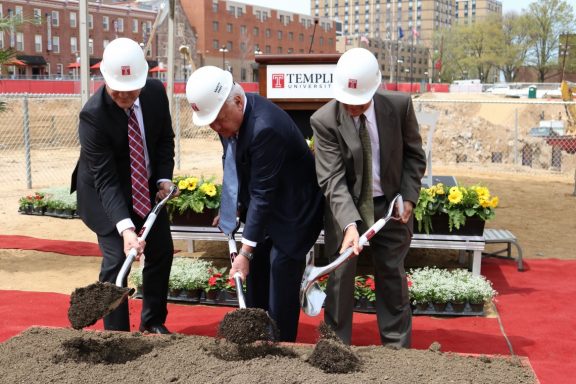
Temple University Board of Trustees Chairman Patrick O’Connor will serve his final term and step down as chair on July 31, 2019.
He will be replaced by trustee Mitchell Morgan, the namesake of Morgan Hall, the Board announced last Tuesday. O’Connor, who was appointed in 1971 as the youngest trustee in university history, will continue to serve on the Board as a trustee.
During the last nine years of O’Connor’s time as chairman, the university grew in size, reached new heights in its endowment and began and completed an array of construction projects. It also reached national headlines for tragedies and scandals.
The Temple News spoke to O’Connor about how the university has changed –– for better and for worse –– during his time at the helm including if he felt it was unethical to represent former trustee Bill Cosby, his thoughts on the proposed on-campus football stadium and why he’s decided to step down.
THE DECISION
Over the last year, O’Connor and his fellow trustees created a succession plan.
“I felt very comfortable as chair,” he added. “I’ve enjoyed my 10 years as chair. I was under no pressure to resign, but I just think good governance mandates a succession plan.”
O’Connor’s decision to wait until next year to step down but remain on the Board is purposeful: the university is undergoing several things he wants to see through, like the Fox School of Business rankings misreporting reviews and the restructuring of Temple University Health System.
“I felt it unfair to step down in the midst of that,” he said. “I’m not one who would run away from a fight or an issue, and I didn’t want to leave the impression that a resignation earlier would be because of these daunting issues. I intend to see my term through as chair and hopefully… move forward and resolve these issues.”
He added that he wants to ensure Morgan has time to prepare new committee chairs and for the role.
“Mitchell is younger,” O’Connor said. “He had new ideas, new leadership style. I think it’s important for a university to experience good change and to have good succession planning.”
Morgan said he’s “certainly not in any way” looking to make major changes to university leadership.
“Chairman O’Connor has done a great job, and I’m hoping just to continue with his legacies,” Morgan said.
He said his decision was not affected by students from Feminist Alliance who called on him to step down from the Board last academic year.
“As a matter of fact, probably it would have made me stay longer, frankly,” he added. “I don’t react to that kind of, what I consider to be, unreal pressure.”
COSBY
O’Connor is a trial lawyer and is the vice chairman of Cozen O’Connor, an international law firm based in Philadelphia.
In 2015, O’Connor began receiving backlash for serving as Cosby’s defense attorney in a 2005 civil suit by former Temple employee Andrea Constand. Cosby was criminally charged in 2015 with three counts of aggravated indecent assault, for which he now is serving three to 10 years in prison.
O’Connor said he has “never” regretted representing him.
“Trial lawyers, and the great trial tradition of Philadelphia lawyers, to represent people in unpopular causes… doesn’t mean you embrace what the person was alleged to have done, it just means that in the great traditions of legal acumen lawyers serve their clients.”

“It’s a chapter of my life I don’t regret,” O’Connor added. “I would do it again. Every person of whatever status in life deserves counsel of their choosing.”
Cosby’s deposition and the settlement Constand received from the civil suit was a prominent part of Cosby’s criminal trial in April. O’Connor was listed as a potential defense witness, but the former trustees defense team did not call him to testify.
“I’m saddened by what’s happened to Bill Cosby and his reputation because he was a great Temple [alumnus] when he was at Temple,” O’Connor said. “It saddens me that this has happened to him.”
“At the same time, the jury believed he victimized people and because of the jury system which we all stand by and which we honor, he’s now serving time in jail,” he added.
He said that at the time he agreed to defend Cosby in the civil suit, he did not know the comedian very well. He added if the assault occurred on a Temple University property or if the university was implicated in the case, he would not have represented him.
“It’s a sad story, because he was a poor kid who got a great education at Temple, was a worldwide super celebrity,” O’Connor added. “Now, no longer. He’s a celebrity for different reasons.”
GROWTH AND SETBACKS
O’Connor joined the Board in 1971 at 28 years old and became the youngest trustee in university history. O’Connor left the Board in 1984 after he was not reappointed.
In 2001, O’Connor returned to the Board after he was appointed by the speaker of the state House of Representatives.
He began his tenure as chairman of the Board in July 2009, replacing former chairman and current trustee Daniel Polett.
Enrollment soared during O’Connor’s tenure as chairman. In 2009, when O’Connor stepped into the leading university role, the university’s enrollment totaled 38,956 students. Last year, the university recorded 40,240 students enrolled, according to the 2017-18 Temple University fact book.
The university’s endowment has also grown exponentially since the start of O’Connor’s tenure as a result of donations from alumni and friends of the university. In June 2012, the university’s endowment was $262 million. The endowment surpassed $500 million in 2016, and it is now $581.9 million.
The university also began construction projects like the $170 million Charles Library, which is set to be open to students and faculty in Fall 2019, and the 27-story Morgan Hall, which opened in Fall 2013.
O’Connor, as Board chair, accepted a $5 million gift from Morgan and his wife Hilarie to name the on-campus housing complex on Broad Street and Cecil B. Moore Avenue after them.
O’Connor led the Board through several university leadership changes, like national searches to replace former presidents Ann Weaver Hart and Neil Theobald.
Hart and Theobald could not be reached for comment.
Hart served as president from May 2006 to June 2012. Theobald was president from 2012 to July 2016. He resigned weeks after the Board voted “no confidence” in Theobald’s leadership because of a $22 million deficit in the university’s financial aid budget and the demotion of former Provost Hai-Lung Dai.
This time period was “an unfortunate chapter in Temple’s history,” O’Connor said Monday.
Under Theobald and O’Connor, the university began talks of an on-campus stadium which remains a controversial topic among students, faculty and community residents.
In 2013, under O’Connor, the Board cut five varsity athletic sports after the university conducted a seven-month analysis of the university’s athletic budget. The analysis recommended the university cut non-revenue sports because of rising operating costs and the tightening of the university’s budget.
More recently, the university has come under fire after an investigation found that the Fox School of Business falsified data for rankings sent to the U.S. News & World Report every year since 2014. Former Dean Moshe Porat was asked to resign and was replaced with interim dean Ron Anderson.
LOOKING BACK AND AHEAD
O’Connor reaffirmed on Monday that he believes a football stadium is the best thing for the university — and the community.
“It would add value to their lives because we would…create jobs for our local citizens,” O’Connor said. “It was going to be a win-win for the university and the residents that surround it. For now, it’s on hold.”
The university expected a decision from city officials on the 35,000-seat facility in June, but it’s since been delayed, The Temple News reported in June.
He said that because it’s on hold, the university will approach the Eagles to negotiate a new contract so the football team has somewhere to play after the 2019 season.
One of the accomplishments he’s most proud of during his tenure as chair is the success of the Fly in 4 program, the ever-growing student population and a “new energy” at the university that’s engaging alumni and prospective students.
But that’s the irony of the Board, he said: trustees can’t take credit for what’s gone right, nor should they be blamed when things have gone wrong.
“People row it, not us,” he added.
O’Connor said in another 10 years, he still sees the university focused on its mission: an affordable, great institution serving a diverse student population.
“I’m 75 years old, I’ve spent a lot of time on Temple matters because I love the school,” O’Connor said. “I love the students, I love what it stands for. It’s a pretty long time as chairman, I’m surprised I lasted that long.”
O’Connor will leave his leading role next year with he and his wife Marie’s name honored at O’Connor Plaza. He’ll also continue to individually support student scholarships, he said.
“Temple is a microcosm that America, as a country which is divided and torn, should emulate,” he said. “Temple is a place that proves that people of all status in life, learning in life, whatever their color is, whatever their nationality is, can work together in a harmonious way and make good things happen.”
Lindsay Bowen, Greta Anderson, Alyssa Biederman and Will Bleier contributed reporting.











Be the first to comment